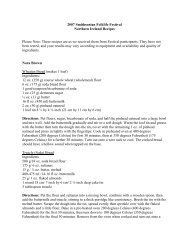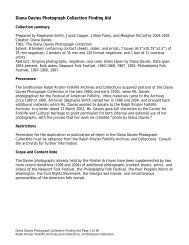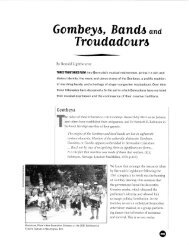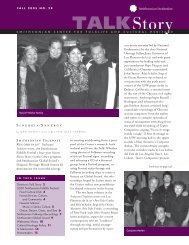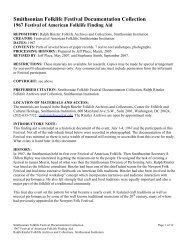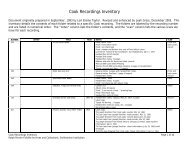Who Owns Traditional Medical Knowledge? - Smithsonian Center ...
Who Owns Traditional Medical Knowledge? - Smithsonian Center ...
Who Owns Traditional Medical Knowledge? - Smithsonian Center ...
You also want an ePaper? Increase the reach of your titles
YUMPU automatically turns print PDFs into web optimized ePapers that Google loves.
MAKING HERITAGE LEGIBLE 163<br />
both ways. Although the underlying bureaucratic impulse of state-based cultural<br />
documentation is to manage and regulate disordered things (culture) as well as<br />
people (subjects), it also simultaneously produces new cultural objects that transform<br />
the nature of knowledge, and new cultural subjects—or “biological citizens”—<br />
who transform the politics of knowledge through contested claims of ownership. 9<br />
These heritage practices also provide a valuable but underused research archive to<br />
explore how norms and normalization inform the exercise of power, particularly<br />
for those at the margins of the state. 10 Taking power in the Foucauldian sense to<br />
mean both sovereign and disciplinary power, the heritage archive can thus be read<br />
not just as ideology, or a strategy that becomes available to indigenous groups<br />
asserting control over medical heritage, but also as an example of coercive power<br />
through which they are constructed as incomplete subjects not fully integrated<br />
into the state. 11 It is in this double sense that I refer to the legibility of medical<br />
heritage: making traditional knowledge legible as an agenda of state control involves<br />
the process of writing, codifying, translating, or digitizing a tradition (the<br />
making of cultural objects); but it also refers to the making and management, and<br />
perhaps erasure, of difficult cultural subjects.<br />
Drawing on a close reading of cultural disputes over a single system of traditional<br />
medicine—the South Asian medical tradition of Ayurveda—this paper will<br />
illustrate and contextualize these paradoxes of legibility and ownership through<br />
a regional lens. The name Ayurveda, which means science of long life in Sanskrit,<br />
refers to the complex of humoral diagnostics and healing practices first codified<br />
in South Asian classical texts in the sixth century b.c., and later transformed in<br />
modern India through a long history of professionalizing reform that was part<br />
of the nationalist project of indigenous revival. 12 As one of the three great scholarly<br />
or written medical traditions of the classical world, namely those that rely<br />
on textual sources of authority, Ayurveda has lent itself especially well to legitimation<br />
strategies (and legibilizing schemes) that revolve around its texts, whether<br />
these are the professionalizing revivalist movements of the twentieth century or<br />
the more recent heritage disputes of the early twenty-first century. 13 My empirical<br />
foci in this paper are three extraordinary heritage protection schemes launched<br />
by the Indian government to protect TMK, all of which revolve Ayurveda and all<br />
of which were initiated within the last five years. Each of these three state practices<br />
involved different state actors (national, regional, subnational), different<br />
forms of intellectual property (copyright, patent, trade-mark), and the production<br />
of different cultural objects: the translation of a monumental seventeenthcentury<br />
Dutch botanical text (Hortus Indicus Malabaricus [henceforth Hortus<br />
Malabaricus]) based on indigenous Ayurvedic knowledge; the creation of a<br />
comprehensive national electronic database of TMK that relied heavily on<br />
Ayurvedic texts; and the research discovery of the first Ayurvedic drug based<br />
on tribal medical knowledge, which then became part of a model bioprospecting<br />
benefit-sharing scheme in the World Intellectual Property Organization<br />
(WIPO).



